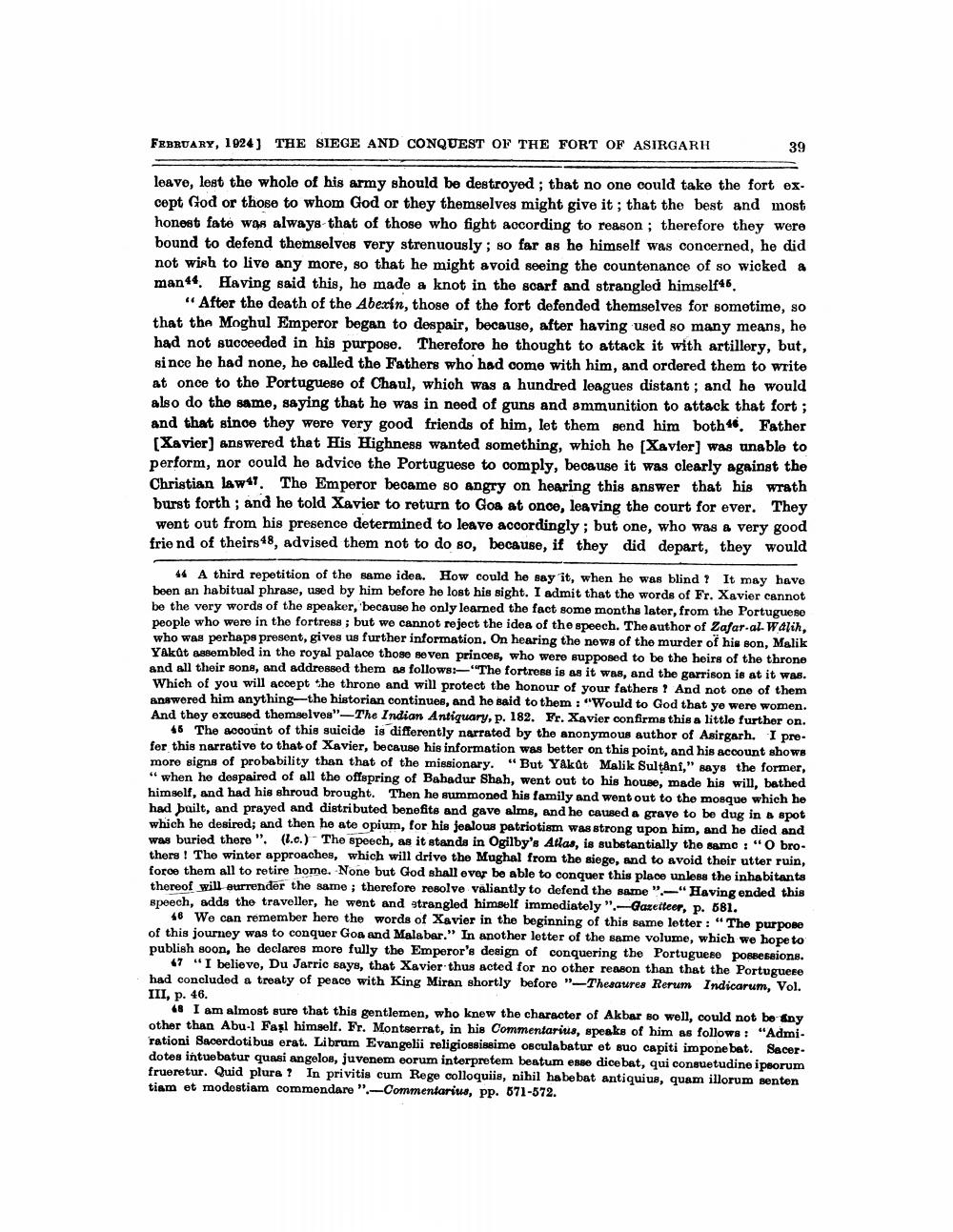________________
FEBRUARY, 1024] THE SIEGE AND CONQUEST OF THE FORT OF ASIRGARH
leave, lest the whole of his army should be destroyed ; that no one could take the fort except God or those to whom God or they themselves might give it ; that the best and most honest fate was always that of those who fight according to reason; therefore they were bound to defend themselves very strenuously; so far as he himself was concerned, he did not wish to live any more, so that he might avoid seeing the countenance of so wicked a man 44. Having said this, he made a knot in the scarf and strangled himself46.
"After the death of the Abexin, those of the fort defended themselves for sometime, so that the Moghul Emperor began to despair, because, after having used so many means, he had not succeeded in his purpose. Therefore he thought to attack it with artillery, but, since he had none, he called the Fathers who had come with him, and ordered them to write at once to the Portuguese of Chaul, which was a hundred loagues distant; and he would also do the same, saying that he was in need of guns and ammunition to attack that fort; and that since they were very good friends of him, let them send him both. Father
Xavier) answered that His Highness wanted something, which he (Xavier) was unable to perform, nor could he advice the Portuguese to comply, because it was clearly against the Christian law41. The Emperor became so angry on hearing this answer that his wrath burst forth; and he told Xavier to return to Goa at once, leaving the court for ever. They went out from his presence determined to leave accordingly; but one, who was & very good friend of theirs 48, advised them not to do so, because, if they did depart, they would
44 A third repetition of the same idea. How could he say it, when he was blind? It may have been an habitual phrase, used by him before he lost his sight. I admit that the words of Fr. Xavier cannot be the very words of the speaker, because he only learned the fact some months later, from the Portuguese people who were in the fortress; but we cannot reject the idea of the speech. The author of Zafar al walih, who was perhaps present, gives us further information. On hearing the news of the murder of his son, Malik YAkat Assembled in the royal palace those seven princes, who were supposed to be the heirs of the throne and all their song, and addressed them was follows: "The fortress is as it was, and the garrison is at it was. Which of you will accept the throne and will protect the honour of your fathers ! And not one of them answered him anything the historian continues, and he said to them: "Would to God that yo were women. And they excused themselves"--The Indian Antiquary, p. 182. Fr. Xavier confirms this a little further on.
46 The account of this suicide is differently narrated by the anonymous author of Asirgarh. I pre. for this narrative to that of Xavier, because his information was better on this point, and his account shows more signs of probability than that of the missionary. "But YАkat Malik Sultani," says the former, " when he despaired of all the offspring of Bahadur Shah, went out to his house, made his will, bathed himsell, and had his shroud brought. Then he summoned his family and went out to the mosque which he had built, and prayed and distributed benefits and gave alms, and he caused a grave to be dug in a spot which he desired; and then he ate opium, for his joalous patriotism was strong upon him, and he died and was buried there". (1.c.)The speech, as it stands in Ogilby's Allas, is substantially the same : "O brothors ! The winter approaches, which will drive the Mughal from the siege, and to avoid their utter ruin, force them all to retire home. None but God shall ever be able to conquer this place unless the inhabitants thereof will aurrender the same; therefore resolve valiantly to defend the same":"Having ended this speech, adds the traveller, he went and strangled himself immediately ". - Gazetteer, p. 581.
46 We can remember here the words of Xavier in the beginning of this same lotter: "The purpose of this journey was to conquer Gon and Malabar." In another letter of the same volume, which we hope to publish soon, he declares more fully the Emperor's design of conquering the Portuguese Possessions.
47 "I believe, Du Jarrio says, that Xavier thus acted for no other reason than that the Portuguese had concluded a treaty of peace with King Miran shortly before " Thesaures Rerum Indicarum, Vol. III, p. 46.
48 I am almost sure that this gentlemen, who knew the character of Akbar so well, could not be any other than Abu-l Fasl himself. Fr. Montserrat, in his Commentarius, speaks of him as follows: "Admi. rationi Sacerdotibus erat. Librum Evangelii religiossissime osculabatur et suo capiti imponebat. Sacer. dotes intuebatur quasi angelos, juvenem eorum interpretem beatum esse dicebat, qui consuetudine ipsorum frueretur. Quid plura ? In privitis cum Rege colloquiis, nihil habebat antiquius, quam illorum senten tiam et modestiam commendare". Commentarius, pp. 671-572.




